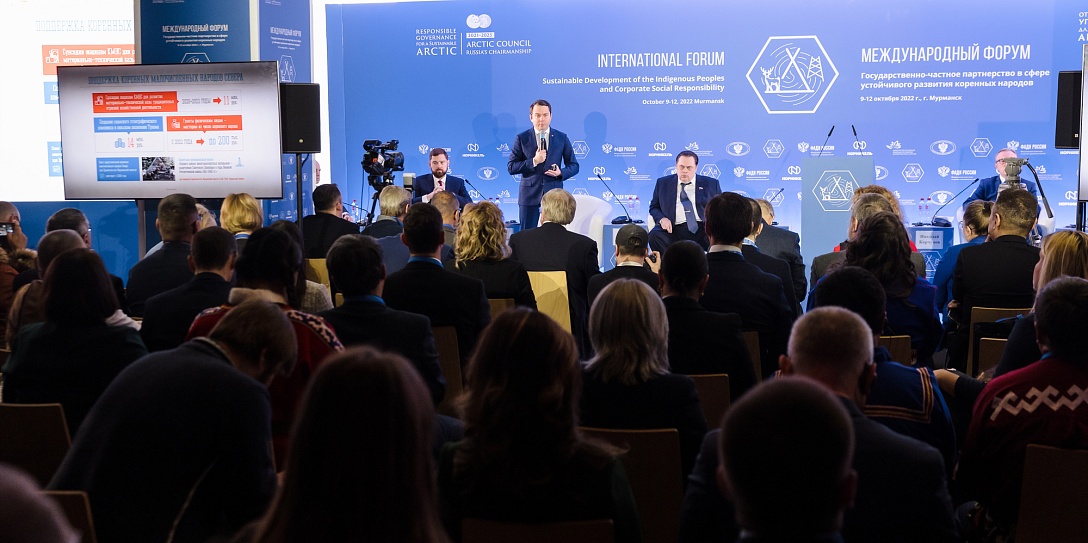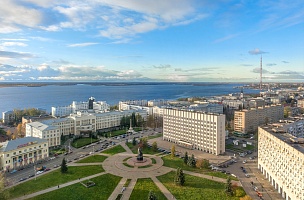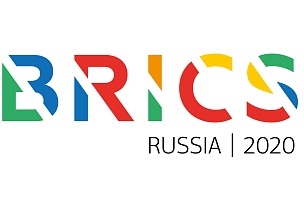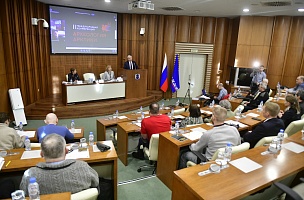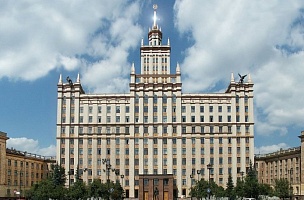Participants in the International Forum ‘Public-Private Partnership for the Sustainable Development of Indigenous Peoples’, which took place in Murmansk on 9–12 October, discussed the social responsibility of entrepreneurs towards Russia’s Indigenous peoples and the impact that companies’ resource potential and corporate policies have on them. The Forum was held as part of the plan of events of Russia’s chairmanship of the Arctic Council in 2021–2023, which are organized by the Roscongress Foundation.
«We have implemented several measures to ensure and protect the intellectual rights of Indigenous peoples. This is crucial in terms of promoting their products and supporting traditional crafts. We have also prepared several draft proposals, including on creative industries, traditional medicine, and the digitalization of cultural and historical heritage. Russia’s chairmanship of the Arctic Council consistently pursues a policy of improving the well-being of northerners, including Indigenous peoples, and promoting the socioeconomic development of the Arctic region. The Murmansk Region, which is the territory of the traditional residence of the Sami [people], is a good example of interaction with Indigenous peoples,» said Nikolay Korchunov, Ambassador-at-Large of the Russian Ministry of Foreign Affairs and Chairman of the Senior Arctic Officials.
Russian Federal Agency for Ethnic Affairs Director Igor Barinov said the Murmansk Region could become an example of how measures are implemented to support Indigenous peoples in an effort to create new focus areas in their activities.
«Representatives of Indigenous peoples live in 28 regions of our country. They lead different lifestyles. It’s difficult to find a common approach and strike a balance here, but we are not trying to regulate everything at the federal level. Rather, we are making it so that the regions are actively involved in the processes of the peoples’ livelihoods while taking into account their specifics,» Barinov said.
Murmansk Region Governor Andrey Chibis pointed out that the region subsidizes the development of basic infrastructure, provides grants for the realization of the potential of Indigenous peoples, and is building special ethnographic facilities, one of which will open soon in Tuloma.
«Thanks to this, representatives of Indigenous peoples will have the opportunity to sell their products and earn extra money. The government and the Sami community have established a good dialogue. One example of our joint work is the opening of the commemorative memorial ‘The Feat of the Reindeer Transport Battalion Fighters and Defenders of the Soviet Arctic’. Norilsk Nickel has also made a significant contribution. This key event made it possible to restore historical justice because the Sami made an invaluable contribution to the victory in World War II,» Chibis said.
Sami public organizations and communities receive state support in the form of competitive grants for the implementation of socially significant initiatives. In 2022, he said more than RUB 2.2 million were allocated for three projects: ‘Cultural Code of National Traditions: Rebranding in Modern Trends’, ‘Azhyanna Tedtvudt’ (‘Knowledge of Ancestors’), and ‘Creation of a Computer Game To Study the Sami Language’. In addition, the Murmansk Region allocates quotas for traditional fishing, and roughly RUB 65 million have been allocated from the federal and regional budgets for the development of reindeer breeding in 2022. The region has also ensured that there is guaranteed demand for this type of activity since virtually all schools in the region serve reindeer dishes.
The Forum programme included a plenary session during which the participants discussed the main models of state regulation of relations between Indigenous peoples and industrial companies, corporate strategies, and ways for business to get involved in ensuring the sustainable development of Indigenous peoples through development programmes and agreements with the authorities. In addition, during the Forum’s sessions and roundtables, experts identified priorities for the sustainable development of Indigenous peoples in the context of industrial activities in the places where they live and ways to reduce the impact of industrial activities, and also discussed prospects for developing a dialogue between the state, business, and Indigenous peoples.
The Forum was attended by representatives of the government authorities in the regions where Indigenous peoples traditionally live, the expert community, non-governmental organizations, multilateral development institutions, and industrial companies, including MMC Norilsk Nickel, Yamal LNG, and Lukoil. The event was organized by the Russian Federal Agency for Ethnic Affairs, the Ministry for the Development of the Russian Far East, the Russian Ministry of Foreign Affairs, and MMC Norilsk Nickel, with the participation of the Charitable Foundation for the Support of Indigenous Peoples of the North, Siberia, and the Far East.
One of the main priorities of Russia’s chairmanship of the Arctic Council in 2021–2023 is to develop human capital in the region, including the Indigenous peoples of the North. Russia devotes special attention to maintaining the sustainability and viability of the peoples of the North, promoting measures to adapt them to climate change, improving people’s well-being, health, education, and quality of life, and ensuring sustainable socioeconomic development throughout the region. The Russian side has initiated projects to digitalize the cultural and linguistic heritage of the Indigenous peoples of the North, develop renewable energy sources, create an international Arctic research station that runs on carbon-free energy, and ensure biosecurity in the Arctic. In addition, Russia is preparing draft proposals on the traditional medicine of Indigenous peoples and the development of creative industries in the Arctic, and is working on an initiative to create Digital Museums of the Arctic.


